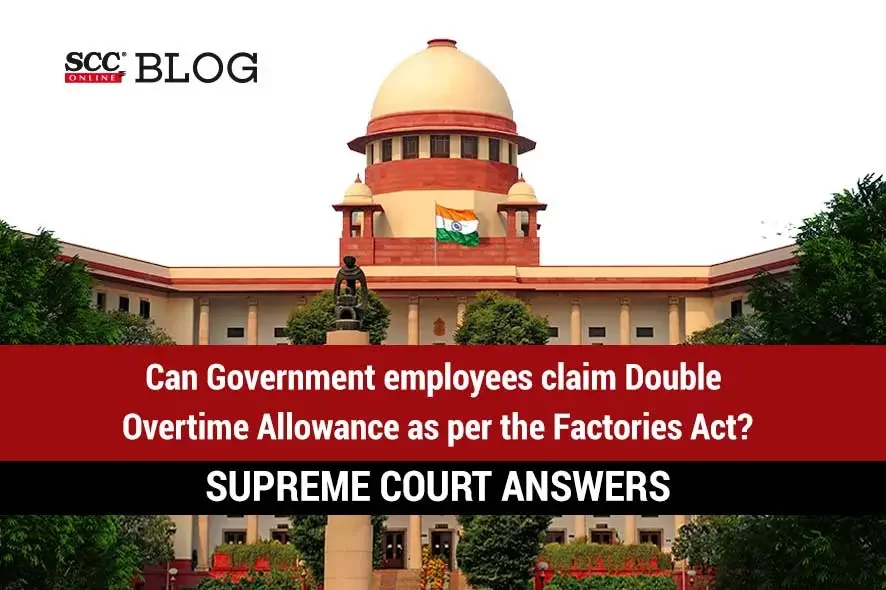Supreme Court: The Security Printing and Minting Corporation of India Limited has appealed against the common order passed by the Bombay High Court which had affirmed the order passed by the Central Administrative Tribunal (‘Tribunal’) which had stated that the employees working as Supervisors were entitled to Double Over Time Allowance. While exercising its civil appellate jurisdiction, the Division Bench of V. Ramasubramanian and Pankaj Mithal J.J., held that the government employees cannot claim double overtime allowance as per the Factories Act, 1948 (‘The Factories Act’), if the service rules do not provide for it.
Issue for consideration
Whether employees working as supervisors at the Security Printing and Minting Corporation of India, under the Ministry of Finance were entitled to double overtime allowance as per Section 59(1) of the Factories Act?
Court Analysis
The Bench was of the view that unlike those employed in factories and industrial establishments, persons in public service who are holders of civil posts or in the civil services of the Union or the State are required to place themselves at the disposal of the Government all the time in accordance with Rule 11 of the Fundamental Rules and Supplementary Rules (‘FRSR’). In the light of the said Rule, there was actually no scope for the respondents to seek payment of Double Over Time Allowance. Thus, no benefit could be claimed by anyone dehors the statutory rules.
The Court stated that the Tribunal completely lost sight of those Rules, and the distinction between employment in a factory and employment in Government service despite the Union of India raising this as a specific issue in their counter affidavit before the Tribunal.
The Bench stated that the claim of the respondents before the Tribunal was not based on any statutory rule but based entirely upon Section 59(1) of the Factories Act. That the persons who were neither civil post holder nor in the civil services of the State and were only governed by the Factories Act may be made to work for 6 days in a week with certain limitations as to weekly hours under Section 51, weekly holidays under Section 52, daily hours under Section 54, etc but they do not enjoy the benefit of automatic wage revision through periodic Pay Commissions like those in Government service. Therefore, the Court stated that the “claim of the respondents ought to have been tested by the Tribunal and the High Court in the proper perspective to see whether it is an attempt to get the best of both the worlds.”
The Court held that neither the Tribunal nor the High Court considered the distinction between persons in Government service and those in private service and the effect of the statutory rules upon the conditions of service of the respondents, including their liability to work for extra hours.
The Bench stated that the High Court erred in holding that the performance of certain functions, such as setting right malfunctioning of feeder, side-lay, double-sheet detector, photocell, etc., to ensure uninterrupted running of the machinery were manual functions. The respondents who were holders of civil posts or in the civil services of the State till the year 2006, could not have claimed the benefits of the provisions of Chapter VI of the Factories Act, dehors the service rules.
The Bench explained that the appointment either to a civil post or in the civil services of the Union or the State was one of a status and that it was not an employment governed strictly by a contract of service or solely by labour welfare legislations.
The Court stated that neither the Tribunal not the High Court considered the distinction between persons in Government service and those in private service and the effect of the statutory rules upon the conditions of service of the respondents, including their liability to work for extra hours. Further that the Tribunal had reached diametrically opposite findings of fact in respect of persons holding similar supervisory posts therefore, the orders of the Tribunal and the High Court were unsustainable.
With the above observation, the Bench allowed the appeal and set aside the impugned order of the High Court which had held that the employees were entitled to overtime benefits as per the Factories Act.
[Security Printing & Minting Corporation of India Limited v Vijay D. Kasbe, 2023 SCC OnLine SC 439, decided on 18-04-2023]
Advocates who appeared in this case :
For the appellant- Advocate Rahul Shyam Bhandari;
For the respondent- Advocate Ravindra Keshavrao Adsure and Advocate Sandeep Sudhakar Deshmukh.






